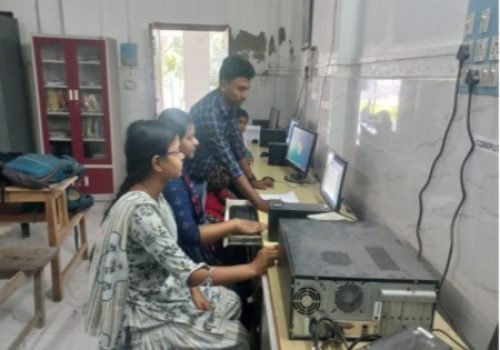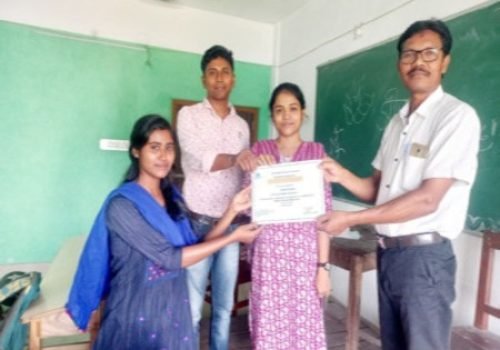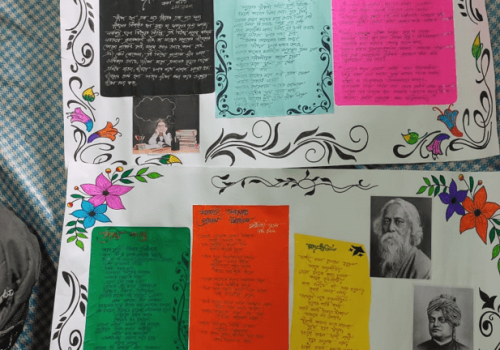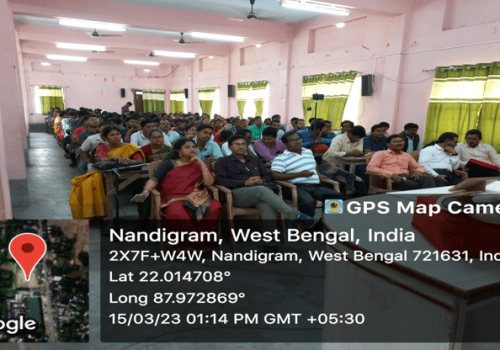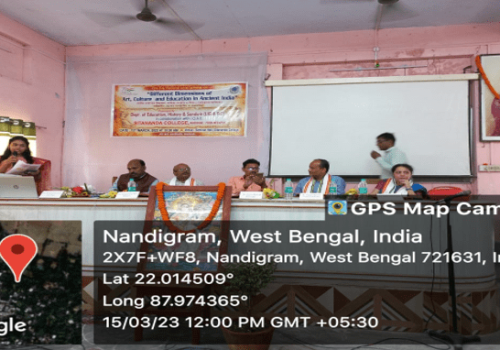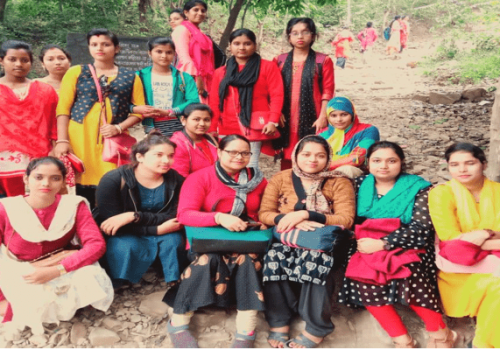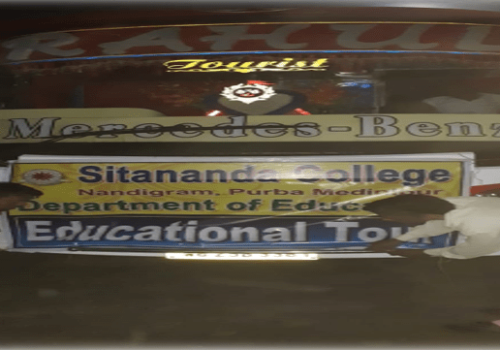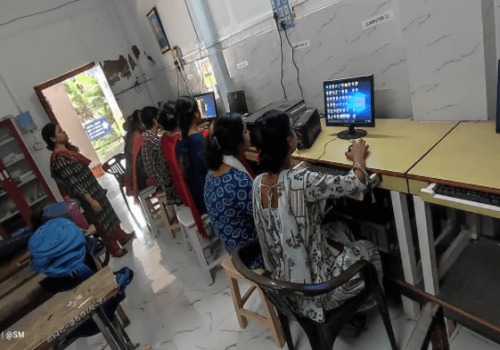Education
Our Departments
Announcements
National Seminar Political Science Brochure
Political Science National Seminar Call for Papers
Library Notice to access E JOURNALS
Library notice for access to e-books
About The Department
History of the Department
Objectives of the Department
- To increase knowledge of education as subject, including its theories, concepts, methods, subfields, and connections to other social sciences.
- To enhance understanding of the educational psychology, including its historical foundations, core values, institutions, and educational policymaking processes.
- To expand knowledge of global scenario of education, including area-specific insights, theoretical frameworks, and their evolving domestic and global contexts.
- To deepen knowledge of Indian and western thought of philosophy and other key areas such as-curriculum development, preparation of teacher, policy plan making, systemization of educational institution and its integrated discourses.
- To increase recognition of the major problems, the leading policies, and the current issues confronting contemporary system of education.
- To increase understanding of educational research and analytical skills.
Mission
- Develop students' intellectual and logical abilities for higher knowledge.
- Foster inquisitiveness and a sense of value for teaching and learning.
- Encourage participation in academic competitions and holistic development.
Vision
- Instill efficiency, empathy, and social responsibility in students.
- Cultivate critical thinking, perseverance, and teamwork.
- Enhance students' intellectual and creative abilities for the job market.
- Promote progressive and liberal education.
Teaching Learning Method
- Class Lectures
- Board Work
- Question-Answering session
- Group Discussion
Future Plans
- To enrich the departmental library.
- To organize national/state level seminar in the department.
- To build a strong student community through varied extensional activities.
- Start some remedial coerces for the students career oriented.
- Introduce M.A In Education in near future.
Academic Activities
- Group Project Work
- Wall Magazine Publication
- ICT and E-learning Integration
- Co-curricular Activities
Challenges
- To impart qualitative and value added education to the students of the department.
- To encourage more and more students to pursue PG and other professional courses so that they can be fit for the present job market.
- To encourage the students of the economically backward section to continue their studies under social constraints.
- To provide educational and vocational guidance and counseling to the students especially to the part Final 6th Sem students so that they become aware of various options for higher studies and job opportunities.
Library Facility
Why Study in this Department?
Department Rules
- Students of the Education Department have to participate in the various events such as seminar, workshop, debates, wall magazine publication etc.
- As per the University norm 75% attendance in class is mandatory for appearing in the final university examination.
- Students must return their borrowed books etc to the Departmental Library before collecting their admit cards from the office for final university exam.
- Students should maintain a healthy academic atmosphere and should not involve in ragging or harassing anybody.
- Internal Examination of the all subjects is mandatory.
- Students must inform the departmental head in written in case of continuous absence for more than seven consecutive days in the class.
- Students must use the dustbins available in the campus.
Departmental Highlights
Location Of The Department: Education Department is located near the Girls’ Hostel Building of the college on the Ground floor. The Department has four separate class room. It has a one room which is used for official works.
- Department of Education Academic Calendar (2018-19, 2019-20, 2022-23)
- Distributions of Syllabus
- Lesson Plan
- Curriculum Planning
Intake Capacity
| Session | Subject | Gen-M/F | SC- M/F | ST- M/F | OBC-A M/F | OBC-B M/F | Total |
|---|---|---|---|---|---|---|---|
| 2018-19 | Education | 6/24(M) (F) | 3/8(M) (F) | 0 | 3/3(M) (F) | 3/6(M) (F) | 56 |
| 2019-20 | Education | 10(M)36(F) | 5(M) 9(F) | 0 | 3(M)3(F) | 4(M) F(4) | 76 |
| 2020-21 | Education | 11/61(M) (F) | 7/10(M) (F) | 0 | 1/5(M) (F) | 3/4(M) (F) | 102 |
| 2021-22 | Education | 13/33(M) (F) | 3/20(M) (F) | 0 | 2/2(M) (F) | 3/0(M) (F) | 76 |
| 2022-23 | Education | 8/51(M) (F) | 5/9(M) (F) | 0 | 1/5(M) (F) | 2/1(M) (F) | 82 |
Students’ Result Analysis (2018-19 to 2022-23)
| Session | No. of students appeared | No. of students passed | No. of students failed | No. of students with 1st Class | No. of students with 2nd Class | Highest scorer | Remark |
|---|---|---|---|---|---|---|---|
| 2018-2019 | 26 | 25 | 01 | 6 | 19 | 560 | Munmun Pal |
| 2019-2020 | 71 | 71 | 0 | 37 | 34 | 583 | Anurupa Parua |
| 2020-2021 | 52 | 52 | 0 | CBCS System Started with CGPA | --- | 8.34 CGPA | Shymasri Bharati |
| 2021-2022 | 51 | 51 | 0 | CBCS System Started with CGPA | --- | 8.77 CGPA | Tulasi Samanta |
| 2022-2023 | 56 | 56 | 0 | CBCS System Started with CGPA | --- | 8.45 CGPA | Moli Ghosh |
Additional Details
1. Cultural Appreciation
Bengali literature offers a profound insight into the rich cultural heritage, traditions, and ethos of the Bengali-speaking people. By studying Bengali literature, students gain a deeper appreciation for the diverse cultural nuances embedded within the language, fostering cross-cultural understanding and respect.
2. Language Proficiency
Bengali literature serves as a linguistic resource for students to enhance their proficiency in the Bengali language. Through exposure to a wide array of literary genres, styles, and linguistic expressions, students develop a nuanced understanding of Bengali grammar, vocabulary, and syntax, thereby strengthening their language skills.
3. Aesthetic Appreciation
Exposure to the literary masterpieces of Bengali literature cultivates students' aesthetic sensibilities and fosters an appreciation for artistic expression. Through the exploration of poetic imagery, narrative techniques, and rhetorical devices, students develop a discerning eye for beauty, creativity, and artistic innovation.
4. Literary Analysis & Interpretation
Studying Bengali literature hones students' analytical and critical thinking abilities as they dissect and interpret complex literary texts. By analyzing themes, characters, motifs, and literary devices, students learn to discern deeper meanings, contextualize historical and social influences, and appreciate the intricacies of narrative structures.
5. Cultural & Historical Context
Bengali literature provides a window into the socio-political, historical, and cultural milieu of Bengal across different epochs. Through the study of literary works spanning various periods, students gain insights into the evolution of Bengali society, its triumphs, challenges, and transformations, thus fostering a holistic understanding of regional history and identity.
6. Identity Formation
Bengali literature plays a pivotal role in shaping individual and collective identities, offering diverse narratives and perspectives that resonate with readers' personal experiences and cultural backgrounds. By engaging with literary works that reflect themes of identity, belonging, and self-discovery, students embark on a journey of introspection and self-awareness, enriching their sense of cultural identity and belongingness.
Department Books
| Sl. No. | Books Name | Writer | Publication |
|---|---|---|---|
| 1 | Education Adjustment & Maladjustment Guidance. | Dr. Sanat Kr. Ghosh | Classic Book House. |
| 2 | Introduction To Education | Dr. Debasish Pal | Rita Book Agency |
| 3 | Psychology Of Education & Development Of Indian History | Buddhadeb Shit & Krishna Jhulki | Maity Publication |
| 4 | Introduction Of Indian Education | Bhakti Bhusan Bhakta | A Aa Ka Kha Publication |
| 5 | Sikkhs Bigyan Dishary | Sanjoy Kr.das | Tapati Publication |
| 6 | Human Rights Education | Dr. Pranab Kr. Chakravarty | Rita Publication |
| 7 | Educational Philisophy & Sociology Of Education | Nimai Chand Ghorai | Santra Publication |
| 8 | Introduction Of Great Educators | Avijit Kr. Pal | Classic Publication |
| 9 | Sikha Bigyan | Basudeb Das | Bela Prakasi |
| 10 | Bisoy Samajtatto | Anadi Kr.mahapatra | Suhridoy Publication |
| 11 | Principal Base Of Education | Sattabrata Bhunia Sagata Bijoli | Maity Publication |
| 12 | Teachers Education | Aniruddha Chakrabarty | Classice Publication |
| 13 | Application Of Educational Philosophy | Nilaljana Chakrobatri, Pranab Kr. Chakraborty | Classic Book House |
Faculty Members
Assistant Professor || Dept. of Education
SACT || Dept. of Education
SACT || Dept. of Education
SACT || Dept. of Education
SACT || Dept. of Education
SACT || Dept. of Education
SACT || Dept. of Education
SACT || Dept. of Education










